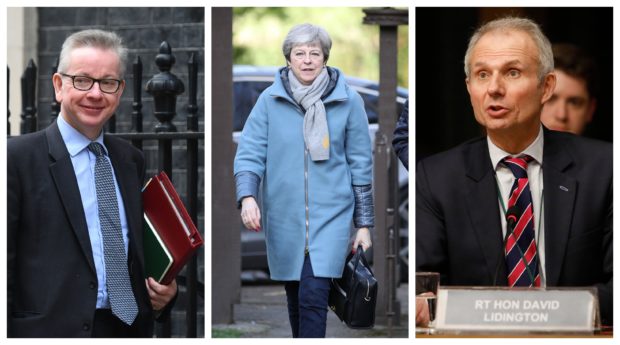Two Cabinet ministers who are said to be in line to take over from Theresa May have dismissed reports of a Cabinet coup to oust her.
Michael Gove and David Lidington both restated their backing for the Prime Minister after speculation of a plot to force her to resign reached fever pitch.
The Environment Secretary said it was “not the time to change the captain of the ship”, while the PM’s de facto deputy said he had no desire to take over the reins.
Chancellor Philip Hammond accused those allegedly trying to topple Mrs May of being “”self-indulgent”, while former party leader Iain Duncan Smith told ministers who briefed against the Prime Minister to apologise and “shut up”.
Meanwhile, Brexit Secretary Steve Barclay warned the risk of a general election would increase if MPs took control of parliamentary proceedings this week and brought about a “constitutional collision”.
Mrs May is understood to be meeting prominent Brexiteers at her country residence, Chequers, on Sunday afternoon, before convening a meeting of the Cabinet on Monday morning.
Among those reportedly attending talks in Buckinghamshire are ministers Mr Lidington, Mr Gove and Mr Barclay, along with chief whip Julian Smith and Eurosceptics Mr Duncan Smith, Boris Johnson, Jacob Rees-Mogg and Dominic Raab.
The Sunday Times claimed 11 Cabinet ministers wanted Mrs May to make way for someone else and Mr Lidington was in line to take over the helm.
But the Mail on Sunday reported ministers were plotting to install the Environment Secretary as a caretaker leader.
Mr Gove told the BBC: “I think this is a time for cool heads. But we absolutely do need to focus on the task at hand and that’s making sure that we get the maximum possible support for the Prime Minister and her deal.”
He added: “It’s not the time to change the captain of the ship, I think what we need to do is to chart the right course.”
Speaking to reporters in his Aylesbury constituency, Mr Lidington, the Chancellor of the Duchy of Lancaster, said: “I don’t think that I’ve any wish to take over from the PM (who) I think is doing a fantastic job.
“I tell you this – one thing that working closely with the Prime Minister does is cure you completely of any lingering shred of ambition to want to do that task.
“I have absolute admiration for the way she is going about it.”
Despite heavy criticism of Mrs May’s handling of the Brexit process and calls from members of her party to stand aside, the Chancellor insisted ousting her would not “solve the problem”.
“To be talking about changing the players on the board frankly is self-indulgent at this time,” Mr Hammond told Sky News’s Sophy Ridge On Sunday.
“This is not about the Prime Minister or any other individual, this is about the future of our country.
“Changing Prime Minister wouldn’t help us, changing the party in Government wouldn’t help us – we’ve got to address the question of what type of Brexit is acceptable to Parliament.”
Mr Hammond also announced Parliament would be given the chance to hold indicative votes on alternatives to the PM’s Brexit deal this week but said a decision had not yet been made on whether Tories would be granted free votes.
After hundreds of thousands of people marched through central London demanding a so-called People’s Vote, he said a second referendum was a “perfectly coherent position” that “deserves to be considered along with the other proposals”.
Meanwhile, an online petition calling on the Government to cancel Brexit reached five million signatures.
MPs will be given the chance to seek to take control of the Brexit process from the Government if they back plans for a series of indicative votes when they vote on their favoured Brexit outcomes on Monday night.
Mr Barclay warned if the amendment, tabled by Tory Sir Oliver Letwin, passes and MPs bring about a “constitutional collision” then the risk of a general election would increase.
He told BBC One’s Andrew Marr Show: “What Parliament has done is vote for a number of contradictory things so we would need to untangle that but ultimately, at its logical conclusion, the risk of a general election increases because you potentially have a situation where Parliament is instructing the executive to do something that is counter to what it was elected to do.”
Brexiteer Mr Duncan Smith told the same programme the last week in politics had been “as close to a national humiliation as I think I’ve seen”.
Lashing out at dissenting ministers, he said: “I think that’s appalling, I think they should be censured and some of them should be sacked.
“And the idea of a cabal, a cabal that never wanted to leave the European Union, turning out to decide what should happen over our future would be unacceptable to my colleagues.”

